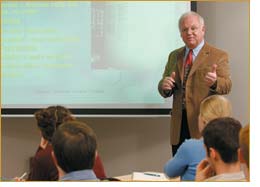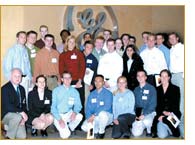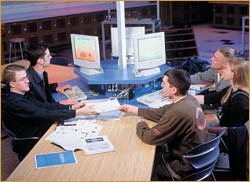| |
Society expects engineers
to contribute to the greater good through technology -- creating
new products and processes. Industry, on the other hand, is looking for
engineers who, while they are technically astute, employ the concepts,
practices, and skills needed to succeed in today’s business environment.
 To successful corporations and successful professionals the “big
picture” and “the bottom line” are more than catch
phrases. Understanding how to be effective in a corporation is what sets
employees apart from their peers. Some companies call this level of comprehension
a “soft skill.” But in today’s work environment it’s
a corporate necessity -- one that an increasing number of companies are
demanding of their current engineers and their new hires. To successful corporations and successful professionals the “big
picture” and “the bottom line” are more than catch
phrases. Understanding how to be effective in a corporation is what sets
employees apart from their peers. Some companies call this level of comprehension
a “soft skill.” But in today’s work environment it’s
a corporate necessity -- one that an increasing number of companies are
demanding of their current engineers and their new hires.
Most engineers learn about business in the workplace. They spend years
in various departments and at numerous levels of management developing
a keen understanding of the marriage between business and technology.
According to the American Society for Engineering Education, the field
of engineering -- with more
than 1.2 million engineers -- is the second-largest profession in the
United States. The National Engineers Week Headquarters in Alexandria,
Va., indicates that more chief executive officers of the top 1,000 publicly
held U.S. companies majored in engineering than any other discipline.
A few engineers learn about business while still in school, with some
completing dual engineering and business degrees. Others pursue graduate
degrees in business. But, there is a growing need for engineers to learn
the fundamentals of business during their undergraduate studies.
While a handful of universities -- particularly those with business schools
-- offer business management training for engineering undergraduates,
the Integrated Engineering and Business Practices Program at the University
of Notre Dame is one of the few programs actually integrated into engineering
curricula. And, it is taught by an engineer.
 When Program Director Robert M. Dunn, joined the University in 2001,
the former vice president of Corporate Manufacturing at IBM brought with
him 33 years of experience. During his tenure at IBM, Dunn’s responsibilities
progressed from those of a design engineer to the manager of major product
development programs for midrange processors to the vice president and
site manager of the corporation’s Poughkeepsie, N.Y., complex,
a facility composed of 15 major divisions and 6,000 employees. He also
managed the development of a multidivisional unit in Dublin, Ireland,
from green field site to operational facility. When Program Director Robert M. Dunn, joined the University in 2001,
the former vice president of Corporate Manufacturing at IBM brought with
him 33 years of experience. During his tenure at IBM, Dunn’s responsibilities
progressed from those of a design engineer to the manager of major product
development programs for midrange processors to the vice president and
site manager of the corporation’s Poughkeepsie, N.Y., complex,
a facility composed of 15 major divisions and 6,000 employees. He also
managed the development of a multidivisional unit in Dublin, Ireland,
from green field site to operational facility.
Dunn graduated from Notre Dame with a bachelor’s degree in engineering
science in 1965. He earned a master’s degree in engineering mechanics
from Pennsylvania State University in 1967 and a doctorate in aeronautical
engineering from the University of Illinois at Urbana-Champaign in 1972.
Over the years his career has involved the management of complex business
relations in North America, South America, Asia, and Europe. His expertise
in product development, technology development, human resources, manufacturing,
and management has proven to be a valuable resource for the engineering
undergraduates in his classes.
The College of Engineering’s business practices program is a two-course
sequence designed to help engineering students develop an understanding
of the dynamics of corporate operations, so they may be better prepared
for managerial and technical leadership roles in the corporate environment.
Integrated Engineering and Business Fundamentals, the first course
in the sequence, focuses on four subject areas: the corporation and
its
financial processes; human resources and management; innovation processes,
including project management; and supply chain processes and quality.
Students learn how to read a financial report, and they study business
planning cycles as they review corporations and their financial processes.
They examine managerial styles and organizational climates and discuss
hiring trends in human resources.
Product development, marketing, and life cycle management are among the
topics covered in the innovation processes segment of the course. The
supply chain section covers topics from manufacturing and procurement
to distribution, flow of materials, and quality concepts -- such as ISO
9000 and Six-Sigma. In addition to classroom instruction, the course
features guest speakers who are professional engineers and managers,
teleconferences with industry executives, and required student presentations.
|
A Company of Their Own
Capacity versus production, market share, fixed assets, depreciation, and gross
margins -- these are the subjects of many of the discussions that students in
the Advanced Topics in Integrated Engineering and Business course have throughout
the semester. The discussions are driven by the Capstone® Business Simulation
software (CAPSIM), a program used by more than 200 universities and corporations
for executive education and management training.
 More than a sophisticated computer game, CAPSIM offers student teams the opportunity
to learn about a company’s inner workings -- how individual functions integrate
into the whole corporation -- and how to develop effective business strategies.
Students using the CAPSIM program become familiar with the forces of market demand,
the fickle nature of customer confidence and buying criteria, and the pressure
that can be applied to a company’s bottom line by competitive products. More than a sophisticated computer game, CAPSIM offers student teams the opportunity
to learn about a company’s inner workings -- how individual functions integrate
into the whole corporation -- and how to develop effective business strategies.
Students using the CAPSIM program become familiar with the forces of market demand,
the fickle nature of customer confidence and buying criteria, and the pressure
that can be applied to a company’s bottom line by competitive products.
“The beauty of CAPSIM,” says Robert M. Dunn, director of the Integrated
Engineering and Business Practices Program, “is that students can see the
impact of their decisions on their company’s position in the market in
a matter of seconds. It has been a real eye-opener for many of them.”
Through the simulation students experience “real-life” corporate
situations such as running out of cash or having the wrong product for the market.
They also learn to work in teams with each student filling a different corporate
position. For example, one student might function as the product manager, while
another would be responsible for research and development.
During the eight-week simulation, where each week is equivalent to a year’s
worth of business, students learn to assess a variety of situations and come
to respect the animated discussions that ultimately lead to more informed decisions.
“This is our second year with the CAPSIM program,” says Dunn, “and
the students have done very well. The most successful team grew its ‘company’ from
a $100 million to a $350 million operation. That’s not bad ... even in
a simulated market.” |
|
 The second course, Advanced
Topics in Integrated Engineering and Business, is comprised
of three main sections -- lecture, case studies and special projects,
and the Capstone® Business Simulation software (CAPSIM). Guest
speakers and a corporate field trip are also part of the advanced topics
course. The second course, Advanced
Topics in Integrated Engineering and Business, is comprised
of three main sections -- lecture, case studies and special projects,
and the Capstone® Business Simulation software (CAPSIM). Guest
speakers and a corporate field trip are also part of the advanced topics
course.
During lectures students learn about globalization, outsourcing, and the creation
of business plans. Case studies and special projects offer them opportunities
to study the successes and failures of others. But the simulation portion of
the class is what they seem to enjoy the most.
CAPSIM teams students together in roles that mimic executives in the corporate
world. One student becomes the product manager. Another is the competitive intelligence
officer. A third might be the marketing manager or human resources professional.
CAPSIM simulations are run every week for a total of eight weeks, and each week’s
efforts correspond to a year’s worth of business. The point is that the
simulation provides students with opportunities to practice what they have been
learning in class.
“CAPSIM takes our students to a level where they can really experience
the dynamic interactions of a company’s operations,” says Dunn. They
learn to assess a multitude of situations, and, because teamwork is encouraged,
they come to respect the animated team discussions as precursors to more informed,
productive, and beneficial decisions.
Throughout both courses students also study the characteristics of modern industrial
leaders. They begin to develop the interpersonal and decision-making skills that
will be required of them as managers and leaders.
 The fact is that an engineering degree, particularly when paired with a keen
understanding of business processes, is very marketable and can be applied in
a variety of careers. For example, three presidents and several governors and
senators have had engineering backgrounds. Engineers are also represented in
the financial community, as well as in manufacturing and academia. Edmund T.
Pratt Jr., former chief executive officer of Pfizer; Roberto C. Goizueta, former
chairman and chief executive officer of Coca-Cola®; and Arthur Nielsen, developer
of the Nielsen rating system, were all engineers. The fact is that an engineering degree, particularly when paired with a keen
understanding of business processes, is very marketable and can be applied in
a variety of careers. For example, three presidents and several governors and
senators have had engineering backgrounds. Engineers are also represented in
the financial community, as well as in manufacturing and academia. Edmund T.
Pratt Jr., former chief executive officer of Pfizer; Roberto C. Goizueta, former
chairman and chief executive officer of Coca-Cola®; and Arthur Nielsen, developer
of the Nielsen rating system, were all engineers.
Notre Dame alumni Larry Augustin, Kevin Connors, and Celeste Volz Ford have also
succeeded in the corporate world. Augustin, a 1984 graduate of the electrical
engineering
department, is chairman of the board of VA Software, a leading provider
of collaborative development tools and software. A 1983 graduate of the Department
of Electrical Engineering, Connors is a general partner in Spray Venture Partners,
a firm that provides capital as well as technical and business expertise to emerging
health-care companies. Volz Ford is the founder and chief executive officer of
Stellar Solutions, Inc. Since founding the company in 1995, this 1978 aerospace
and mechanical engineering graduate has also established the Stellar Solutions
Foundation, a venture investing and incubating organization focused on early-stage
technology development and market applications.
The bottom line is that engineers can bring technical and problem-solving skills
to a wide range of industries. “The challenge,” says Dunn, “is
learning how to best apply those skills.”
For more information on the Integrated Engineering and Business Practices Program
visit:
http://www.nd.edu/~engineer/engbiz
|
The Importance of a Business Program for Engineering
Majors
Engineering students at Notre Dame are lining up to participate in
the two courses offered through the Integrated Engineering and Business
Practices Program. As electives, Integrated Engineering and Business
Fundamentals and Advanced Topics in Integrated Engineering and Business
are giving students what they term “a competitive advantage.”
 Whether learning how to write a more effective resume or developing
better public speaking and presentation skills, students in these
courses have been very vocal and very excited about their experiences. “I
took the first course in the first semester of my junior year,” says
Nikolas Larsen, a senior in chemical engineering, “and I am
currently enrolled in the second one.” By December 2003, more
than half of the University’s engineering graduates -- Classes
of 2002, 2003, and 2004 -- will have taken the fundamentals course.
And, many of the students who take the first course enroll in the
second. Whether learning how to write a more effective resume or developing
better public speaking and presentation skills, students in these
courses have been very vocal and very excited about their experiences. “I
took the first course in the first semester of my junior year,” says
Nikolas Larsen, a senior in chemical engineering, “and I am
currently enrolled in the second one.” By December 2003, more
than half of the University’s engineering graduates -- Classes
of 2002, 2003, and 2004 -- will have taken the fundamentals course.
And, many of the students who take the first course enroll in the
second.
 Why? According to Larsen and Shana Blair, a senior in the Department
of Computer Science and Engineering, the courses provide management
concepts, knowledge, and skills not typically introduced in undergraduate
engineering curricula. “I have always believed that an engineer
wishing to end up in a management position should have some kind
of background in business,” says Blair. “These courses
helped me become more confident in myself and in my understanding
of business practices so that I can offer extremely competitive technical
and business skills to a company. ... I can be a more valuable asset
to my company.” Why? According to Larsen and Shana Blair, a senior in the Department
of Computer Science and Engineering, the courses provide management
concepts, knowledge, and skills not typically introduced in undergraduate
engineering curricula. “I have always believed that an engineer
wishing to end up in a management position should have some kind
of background in business,” says Blair. “These courses
helped me become more confident in myself and in my understanding
of business practices so that I can offer extremely competitive technical
and business skills to a company. ... I can be a more valuable asset
to my company.” |
|
|
|


 The second course, Advanced
Topics in Integrated Engineering and Business, is comprised
of three main sections -- lecture, case studies and special projects,
and the Capstone® Business Simulation software (CAPSIM). Guest
speakers and a corporate field trip are also part of the advanced topics
course.
The second course, Advanced
Topics in Integrated Engineering and Business, is comprised
of three main sections -- lecture, case studies and special projects,
and the Capstone® Business Simulation software (CAPSIM). Guest
speakers and a corporate field trip are also part of the advanced topics
course. The fact is that an engineering degree, particularly when paired with a keen
understanding of business processes, is very marketable and can be applied in
a variety of careers. For example, three presidents and several governors and
senators have had engineering backgrounds. Engineers are also represented in
the financial community, as well as in manufacturing and academia. Edmund T.
Pratt Jr., former chief executive officer of Pfizer; Roberto C. Goizueta, former
chairman and chief executive officer of Coca-Cola®; and Arthur Nielsen, developer
of the Nielsen rating system, were all engineers.
The fact is that an engineering degree, particularly when paired with a keen
understanding of business processes, is very marketable and can be applied in
a variety of careers. For example, three presidents and several governors and
senators have had engineering backgrounds. Engineers are also represented in
the financial community, as well as in manufacturing and academia. Edmund T.
Pratt Jr., former chief executive officer of Pfizer; Roberto C. Goizueta, former
chairman and chief executive officer of Coca-Cola®; and Arthur Nielsen, developer
of the Nielsen rating system, were all engineers. To successful corporations and successful professionals the “big
picture” and “the bottom line” are more than catch
phrases. Understanding how to be effective in a corporation is what sets
employees apart from their peers. Some companies call this level of comprehension
a “soft skill.” But in today’s work environment it’s
a corporate necessity -- one that an increasing number of companies are
demanding of their current engineers and their new hires.
To successful corporations and successful professionals the “big
picture” and “the bottom line” are more than catch
phrases. Understanding how to be effective in a corporation is what sets
employees apart from their peers. Some companies call this level of comprehension
a “soft skill.” But in today’s work environment it’s
a corporate necessity -- one that an increasing number of companies are
demanding of their current engineers and their new hires. When Program Director
When Program Director  More than a sophisticated computer game, CAPSIM offers student teams the opportunity
to learn about a company’s inner workings -- how individual functions integrate
into the whole corporation -- and how to develop effective business strategies.
Students using the CAPSIM program become familiar with the forces of market demand,
the fickle nature of customer confidence and buying criteria, and the pressure
that can be applied to a company’s bottom line by competitive products.
More than a sophisticated computer game, CAPSIM offers student teams the opportunity
to learn about a company’s inner workings -- how individual functions integrate
into the whole corporation -- and how to develop effective business strategies.
Students using the CAPSIM program become familiar with the forces of market demand,
the fickle nature of customer confidence and buying criteria, and the pressure
that can be applied to a company’s bottom line by competitive products. Whether learning how to write a more effective resume or developing
better public speaking and presentation skills, students in these
courses have been very vocal and very excited about their experiences. “I
took the first course in the first semester of my junior year,” says
Nikolas Larsen, a senior in chemical engineering, “and I am
currently enrolled in the second one.” By December 2003, more
than half of the University’s engineering graduates -- Classes
of 2002, 2003, and 2004 -- will have taken the fundamentals course.
And, many of the students who take the first course enroll in the
second.
Whether learning how to write a more effective resume or developing
better public speaking and presentation skills, students in these
courses have been very vocal and very excited about their experiences. “I
took the first course in the first semester of my junior year,” says
Nikolas Larsen, a senior in chemical engineering, “and I am
currently enrolled in the second one.” By December 2003, more
than half of the University’s engineering graduates -- Classes
of 2002, 2003, and 2004 -- will have taken the fundamentals course.
And, many of the students who take the first course enroll in the
second. Why? According to Larsen and Shana Blair, a senior in the Department
of Computer Science and Engineering, the courses provide management
concepts, knowledge, and skills not typically introduced in undergraduate
engineering curricula. “I have always believed that an engineer
wishing to end up in a management position should have some kind
of background in business,” says Blair. “These courses
helped me become more confident in myself and in my understanding
of business practices so that I can offer extremely competitive technical
and business skills to a company. ... I can be a more valuable asset
to my company.”
Why? According to Larsen and Shana Blair, a senior in the Department
of Computer Science and Engineering, the courses provide management
concepts, knowledge, and skills not typically introduced in undergraduate
engineering curricula. “I have always believed that an engineer
wishing to end up in a management position should have some kind
of background in business,” says Blair. “These courses
helped me become more confident in myself and in my understanding
of business practices so that I can offer extremely competitive technical
and business skills to a company. ... I can be a more valuable asset
to my company.”